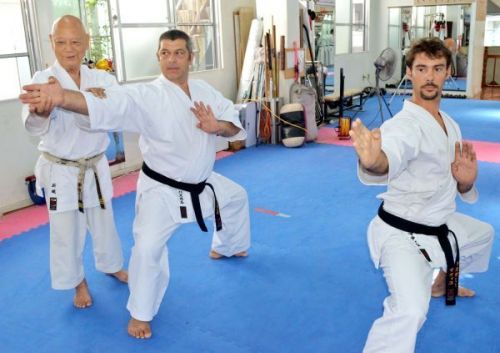French practitioners hone their skills at karate’s birthplace in Okinawa

On July 5 at Okinawa Goju-ryu Karate Goyukan, Ibert (center) and Carré (right) receive instruction from Anyu Shinjo (left).
July 11, 2017 Ryukyu Shimpo
Pascal Ibert a Nana-dan (7th rank) practitioner of Okinawa Goju-ryu Karate has been training for 38 years in Dordogne, southern France, where he now teaches about 50 students. For three consecutive years beginning in 2015, he has traveled to Yamashita Town, Naha to Okinawa Goju-ryu Karate Goyukan in order to learn karate Kata (forms) from Anyu Shinjo, a juu-dan (10th rank) practitioner. From June 15 through July 10, he stayed in Okinawa along with Matthieu Carré, one of the pupils from his dojo in France, learning fundamental Kata from Shinjo. They intended to hone their Waza (techniques) and inner strength by training at karate’s birthplace with a local hanshi (a title reserved for the few top experts; a teacher of teachers).
Ibert began his karate training in 1979 after watching demonstrations and matches at a karate tournament in France. Formerly he had experience in Tai Chi Chuan, but through witnessing karate etiquette and the respect shown toward one’s opponent, he perceived that karate has a different philosophy from other martial arts. Looking back on his first time watching karate, Ibert said that he noticed breathing techniques, posture, Kata, and other idiosyncrasies in karate that were not present in other martial arts. He was fascinated.
In July 2015, Ibert first visited Shinjo’s dojo, introduced by an acquaintance. This year he once again received training in traditional karate Kata from Shinjo, who was trained by Eiichi Miyazato, a personal pupil of the founder of Okinawa Goju-ryu Karate, Chojun Miyagi. Shinjo claimed, “It is my duty to teach authentic Kata.” He said that he takes pride in seeing practitioners come all the way from France to train with all their might.
Carré, who has been training at Ibert’s dojo for about ten years, said, “Rather than achieving higher ranks, my goal is to polish my technique and perform flawless demonstrations.”
Ibert said, “Although aspects of teaching are different in France, the Kata and Waza are unchanged. I want to accurately pass on what I have learned [in Okinawa].”
(English translation by T&CT and Erin Jones)
Previous Article:Chibana Hanaui to produce kariyushi shirts to increase popularity
Next Article:Symbol of burials in Yonashiroteruma, Uruma dismantled as cremation takes its place
[Similar Articles]
- The best in the world from 50 countries show their stuff at the Okinawa Traditional Karate Ceremony
- Seven karate masters receive service awards
- Symposium on Karate and Chinese Martial Arts held in Urasoe
- 130 Karate-ka from all over the world gather for Shima-ha Shorin-ryu training camp
- Six Dojos come together to perform Karate demonstration praying for the Shuri Castle reconstruction and to give courage to the region
 Webcam(Kokusai Street)
Webcam(Kokusai Street)


